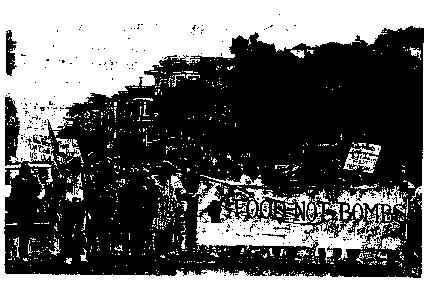
| Contents | Start | Previous | Next |
Decision-Making
Another goal of Food Not Bombs is the creation of opportunities for self-empowerment. The way to do this within the group is to create an environment where every member is encouraged to participate in decision-making, take initiative, and fill the various roles necessary for smooth functioning of the group.
We make decisions by consensus rather than by voting. Voting is a win or lose model in which people are often more concerned about the numbers it takes to win a majority than they are in the issue itself:
Consensus, on the other hand, is a process of synthesis, bringing together diverse elements and blending them into a decision which is acceptable to the entire group. In essence, it is a qualitative rather than quantitative method of decision-making. Each person's ideas are valued and become part of the decision.
When everyone participates in the discussion of an idea, trust develops and people feel valued and committed to the result. A proposal is stronger when everyone works together to create the best possible decision for the group. Any idea can be considered, but only those ideas everyone thinks are in the best interests of the group are adopted.
There are several models of consensus that your group might choose to adopt. It is most important, however, that whatever process you use is clear, consistent, and able to be easily taught and learned so that all can participate fully. (See Bibliography in the appendix).
Many progressive groups avoid having leaders who might dominate the group. However, it is a mistake to think that a group does not need leadership roles. To avoid having power concentrated in the hands of a few entrenched leaders, encourage leadership skills in every member of your group and rotate all roles. This can be accomplished by holding skill-building trainings and by encouraging and supporting people to be self-empowered, especially those who are generally reserved. This helps the group become more democratic and helps individuals feel more satisfied and, therefore, less likely to burn-out or fade away.
Outreach
Outreach is very important, less expensive and more effective than you might imagine. The appendix of this book has a recruiting flyer you can use that has been effective in attracting new people to Food Not Bombs. You can use this copy by putting your phone number and address in the appropriate spots, or you can create your own. This and other flyers can then be put on bulletin boards in local schools, cafes, health food stores, bookstores, and launderettes. Post recruitment flyers on a regular basis; it is good to continually bring in new people with fresh ideas and enthusiasm.
In addition to posting flyers in public spaces, visit all the peace and justice organizations in your community. Leave your flyers and collect their literature to place on your own information table.
Also go to all the soup kitchens, pantries, shelters, and advocacy groups
for those suffering from economic injustice and distribute your literature.
Don't be discouraged by a lukewarm reception. At first, these groups might
view Food Not Bombs as competition for scare resources, or they may be
strongly opposed to connecting the issues of hunger, homelessness, and
economic injustice with other political issues such as militarism. Many
direct service agencies accept the role of care-giver for those most oppressed
in our society without challenging the root causes of that oppression.
They prefer to keep a low profile and support the status quo and
will be very fearful of anyone who does challenge the system. However,
because the vision of Food Not Bombs is the creation of abundance by recovering
surplus food, your free food will be a way to reach out to them and gradually
win their support. This kind of outreach will become the foundation of
widespread community support that could be very valuable to your group
in the future.

| Contents | Start | Previous | Next |